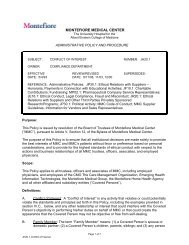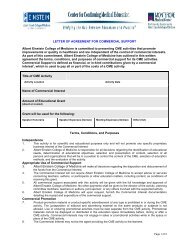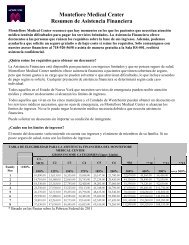Medical Staff House Staff Orientation Manual - Montefiore Medical ...
Medical Staff House Staff Orientation Manual - Montefiore Medical ...
Medical Staff House Staff Orientation Manual - Montefiore Medical ...
You also want an ePaper? Increase the reach of your titles
YUMPU automatically turns print PDFs into web optimized ePapers that Google loves.
HOW:<br />
• Capacitated patients may refuse any treatment, including life-sustaining treatment.<br />
• Health care agents for incapacitated patients may customarily refuse life-sustaining treatment<br />
for the incapacitated patient. (See the policy for requirements.)<br />
• Most treatment decisions for incapacitated patients who do not have appointed health care<br />
agents are made by the attending physician in conjunction with the patient’s family or other<br />
surrogate. These include decisions not to initiate specific treatments that would not be<br />
medically indicated based on the patient’s condition and prognosis.<br />
• Family members may also request the foregoing of one or more life-sustaining interventions<br />
that are already underway (in particular, ventilatory support, ventricular assist devices,<br />
dialysis and/or artificial nutrition or hydration). This is done by providing information about<br />
the patient’s prior declared treatment wishes, indicating that the now-incapacitated patient<br />
would have chosen to forego life-sustaining treatment under the current circumstances. The<br />
Office of the <strong>Medical</strong> Director must be called to review the information provided by the<br />
family and the physician documentation of this process.<br />
• When a patient has no available or willing surrogate, life-sustaining treatment may be<br />
foregone if such interventions(s) would merely prolong the dying process or increase<br />
suffering. A Bioethics, Critical Care and/or Palliative Medicine consult may be helpful in<br />
determining an appropriate plan of care. The <strong>Medical</strong> Director’s Office must be contacted in<br />
these circumstances to coordinate multi-disciplinary review.<br />
• Parents and legal guardians of minor patients may decide to forego life-sustaining treatments.<br />
Pediatric Ethics, Bioethics, the Chief of Service, Palliative Care and/or the <strong>Medical</strong><br />
Director’s Office should be involved. Such decisions are made in the best interest of the<br />
child. Consideration is given to the wishes of the parent and the child. The child is included<br />
in the discussions, as appropriate.<br />
• DNI orders are written to forego intubation in any circumstance other than cardiopulmonary<br />
arrest. (See the Do-not-intubate (DNI) Policy for guidance in entering DNI orders for<br />
decisions to forego intubation or re-intubation for moderate to severe respiratory distress or<br />
any situation other than cardiopulmonary arrest).<br />
CONTACT:<br />
<strong>Medical</strong> Director 718-920-7052; 6078<br />
Bioethics (Moses) 718-920-6226<br />
(Weiler) 718-904-2299<br />
INFORMED CONSENT AND REFUSAL<br />
Administrative Policy and Procedure JC10.1<br />
Note: This summary contains key points of <strong>Montefiore</strong>'s consent policy. For complete<br />
understanding of all the relevant provisions. it is necessary to thoroughly read the full policy.<br />
WHEN<br />
Informed consent is required for all procedures or treatments that are invasive or have potentially<br />
serious side effects or complications. When a patient is a conscious and mentally capable adult,<br />
101

















